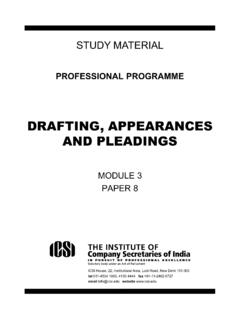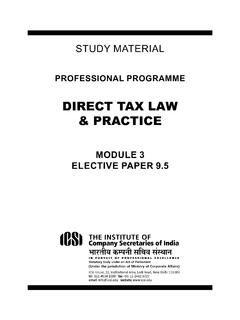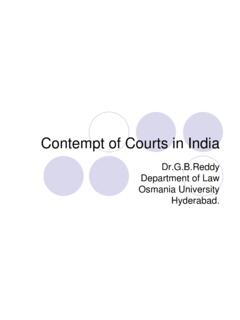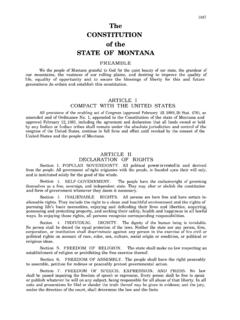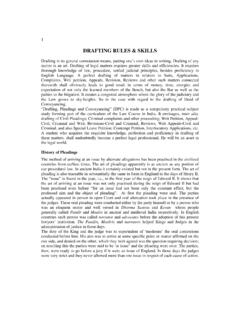Transcription of IN THE SUPREME COURT OF INDIA CRIMINAL ORIGINAL …
1 REPORTABLEIN THE SUPREME COURT OF INDIACRIMINAL ORIGINAL JURISDICTIONSUO MOTU WRIT petition (CRL.) OF 2020In Re: EXPEDITIOUS TRIAL OF CASES UNDER SECTION138 OF ACT R D E leave petition ( CRIMINAL ) No. 5464 of 2016pertains to dishonour of two cheques on for anamount of ,70,000/-. The dispute has remained pendingfor the past 16 years. Concerned with the large number ofcases filed under Section 138 of the Negotiable InstrumentsAct, 1881 (hereinafter 'the Act') pending at various levels, aDivision Bench of this COURT consisting of two of us (the ChiefJustice of INDIA and L. Nageswara Rao, J.) decided to examinethe reasons for the delay in disposal of these cases. TheRegistry was directed to register a Suo Motu Writ petition ( CRIMINAL ) captioned as Expeditious Trial of Cases underSection 138 of Act 1881 . Mr. Sidharth Luthra, learnedSenior Counsel was appointed as Amicus Curiae and Mr. , learned Counsel was requested to assist | P a g eNotices were issued to the Union of INDIA , Registrar Generals ofthe High Courts, Director Generals of Police of the States andUnion Territories, Member Secretary of the National LegalServices Authority, Reserve Bank of INDIA and Indian Banks Association, Mumbai as the representative of learned Amici Curiae submitted a preliminary reporton which was circulated to all the Respondents.
2 , the learned Amici Curiae informed this COURT thatonly 14 out of 25 High Courts had submitted their responses tothe preliminary report. The Reserve Bank of INDIA had also filedits suggestions. Seven Directors General of Police had filedtheir affidavits putting forward their views to the preliminaryreport. The parties who had not filed their responses weregranted further time and the matter was listed on final disposal. During the course of the hearing, it was feltby a Bench of three Judges, consisting of the Chief Justice ofIndia, L. Nageswara Rao, J. and S. Ravindra Bhat, J. that thematter had to be considered by a larger bench in view of theimportant issues that arose for determination before this reference of the matter to a larger bench was also2 | P a g enecessitated due to the submission made by the learned AmiciCuriae that certain judicial pronouncements of this Courtneeded clarification. We have heard learned Amici Curiae,Advocates for some States, the learned Solicitor General ofIndia, Mr.
3 Vikramjit Banerjee, learned Additional SolicitorGeneral of INDIA , Mr. Ramesh Babu, Advocate for the ReserveBank of INDIA and Dr. Lalit Bhasin, Advocate for the IndianBanks XVII inserted in the Act, containing Sections 138to 142, came into force on Dishonour of chequesfor insufficiency of funds was made punishable withimprisonment for a term of one year or with fine which mayextend to twice the amount of the cheque as per Section 139 dealt with the presumption in favour of the holderthat the cheque received was for the discharge, in whole or inpart, of any debt or other liability. The defence which may notbe allowed in a prosecution under Section 138 of the Act isgoverned by Section 140. Section 141 pertains to offences bycompanies. Section 142 lays down conditions under whichcognizance of offences may be taken under Section 138. Overthe years, courts were inundated with complaints filed under3 | P a g eSection 138 of the Act which could not be decided within areasonable period and remained pending for a number ofyears.
4 Gargantuan pendency of complaints filed underSection 138 of the Act has had an adverse effect in disposal ofother CRIMINAL cases. There was an imminent need forremedying the situation which was addressed by theNegotiable Instruments (Amendment and MiscellaneousProvisions) Act, 2002. Sections 143 to 147 were inserted in theAct, which came into force on Section 143 of theAct empowers the COURT to try complaints filed under Section138 of the Act summarily, notwithstanding anything containedin the Code of CRIMINAL Procedure, 1973 (hereinafter, theCode ). Sub-section (3) of Section 143 stipulates that anendeavour be made to conclude the trial within six monthsfrom the date of filing of the complaint. Section 144 deals withthe mode of service of summons. Section 145 postulates thatthe evidence of the complainant given by him on affidavit maybe read as evidence in any inquiry, trial or other proceedingunder the Code.
5 Bank s slip or memo denoting that the chequehas been dishonoured is presumed to be prima facie evidence4 | P a g eof the fact of dishonour of the cheque, according to Section146. Section 147 makes offences punishable under the Actcompoundable. The punishment prescribed under the Act wasenhanced from one year to two years, along with otheramendments made to Sections 138 to 142 with which we arenot concerned in this case. situation has not improved as courts continue tostruggle with the humongous pendency of complaints underSection 138 of the Act. The preliminary report submitted bythe learned Amici Curiae shows that as on , the totalnumber of CRIMINAL cases pending was crores, out of lakh pertained to Section 138 of the Act. The reasonsfor the backlog of cases, according to the learned Amici Curiae,is that while there is a steady increase in the institution ofcomplaints every year, the rate of disposal does not match therate of institution of complaints.
6 Delay in disposal of thecomplaints under Section 138 of the Act has been due toreasons which we shall deal with in this order. learned Amici Curiae identified seven major issuesfrom the responses filed by the State Governments and UnionTerritories which are as under:5 | P a g ea)Service of summonsb)Statutory amendment to Section 219 of the Code c)Summary trials d)Attachment of bank accounts e)Applicability of Section 202 of the Codef)Mediationg)Inherent jurisdiction of the Magistrate of summons on the accused in a complaint filedunder Section 138 of the Act has been one of the main reasonsfor the delay in disposal of the complaints. After examiningthe responses of the various State Governments and UnionTerritories, several suggestions have been given by the learnedAmici Curiae for speeding up the service of summons. Some ofthe suggestions given by him pertain to dishonour slips issuedby the bank under Section 146 of the Act, disclosing the currentmobile number, email address and postal address of the drawerof the cheque, the details of the drawer being given on thecheque leaf, creation of a Nodal Agency for electronic service ofsummons and generation of a unique number from thedishonour memo.
7 The Union of INDIA and the Reserve Bank ofIndia were directed to submit their responses to thesuggestions made by the learned Amici Curiae on these6 | P a g easpects. After hearing the learned Solicitor General of Indiaand Mr. Ramesh Babu, learned counsel for the Reserve Bank ofIndia, on , it was considered appropriate by thisCourt to form a Committee with Hon ble Mr. Justice , former Judge of the Bombay High COURT , as theChairman to consider various suggestions that are made forarresting the explosion of the judicial docket. Therecommendations made by the learned Amici Curiae relating toattachment of bank accounts to the extent of the chequeamount, pre-summons mediation and all other issues which arepart of the preliminary note and the written submissions of thelearned Amici Curiae shall be considered by theaforementioned Committee, in addition to other related issueswhich may arise during such consideration.
8 The Committee isdirected to deliberate on the need for creation of additionalcourts to try complaints under Section 138 of the Act. MECHANICAL CONVERSION OF SUMMARY TRIAL TOSUMMONS TRIAL learned Amici Curiae submitted that Section 143 ofthe Act provides that Sections 262 to 265 of the Code shallapply for the trial of all offences under Chapter XVII of the | P a g eThe second proviso empowers the Magistrate to convert thesummary trial to summons trial, if he is of the opinion that asentence of imprisonment exceeding one year may have to bepassed or that it is undesirable to try the case summarily, afterrecording reasons. The learned Amici Curiae has brought tothe notice of this COURT that summary trials are routinelyconverted to summons trials in a mechanical manner. Thesuggestions made by him in his preliminary note that the HighCourts should issue practice directions to the Trial Courts forrecording cogent and sufficient reasons before converting asummary trial to summons trial have been accepted by theHigh Courts.
9 143 of the Act has been introduced in the year2002 as a step-in aid for quick disposal of complaints filedunder Section 138 of the Act. At this stage, it is necessary torefer to Chapter XXI of the Code which deals with summarytrials. In a case tried summarily in which the accused does notplead guilty, it is sufficient for the Magistrate to record thesubstance of the evidence and deliver a judgment, containing abrief statement of reasons for his findings. There is arestriction that the procedure for summary trials under Section8 | P a g e262 is not to be applied for any sentence of imprisonmentexceeding three months. However, Sections 262 to 265 of theCode were made applicable as far as may be for trial of anoffence under Chapter XVII of the Act, notwithstanding anythingcontained in the Code. It is only in a case where the Magistrateis of the opinion that it may be necessary to sentence theaccused for a term exceeding one year that the complaint shallbe tried as a summons trial.
10 From the responses of variousHigh Courts, it is clear that the conversion by the Trial Courts ofcomplaints under Section 138 from summary trial to summonstrial is being done mechanically without reasons beingrecorded. The result of such conversion of complaints underSection 138 from summary trial to summons trial has beencontributing to the delay in disposal of the cases. Further, thesecond proviso to Section 143 mandates that the Magistratehas to record an order spelling out the reasons for suchconversion. The object of Section 143 of the Act is quickdisposal of the complaints under Section 138 by following theprocedure prescribed for summary trial under the Code, to theextent possible. The discretion conferred on the Magistrate bythe second proviso to Section 143 is to be exercised with duecare and caution, after recording reasons for converting the9 | P a g etrial of the complaint from summary trial to summons , the purpose for which Section 143 of the Act hasbeen introduced would be defeated.
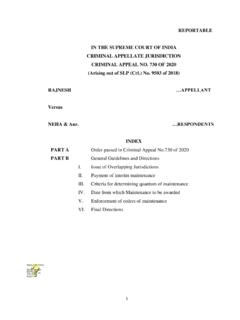
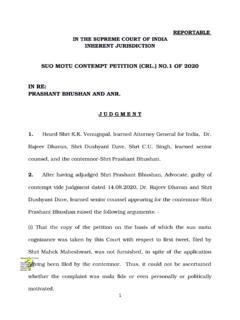
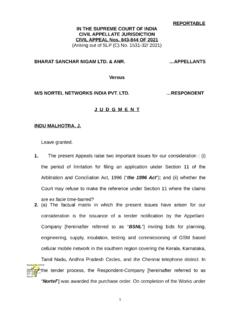
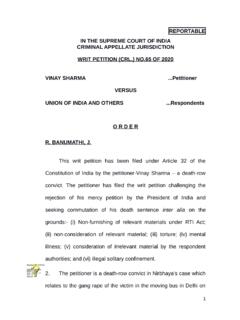
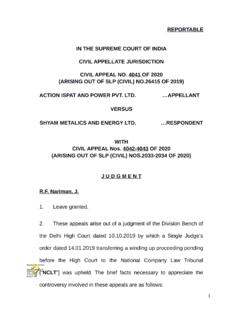
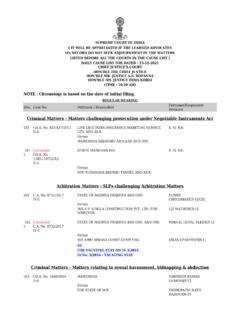
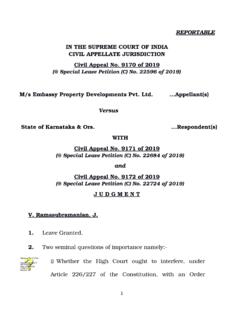
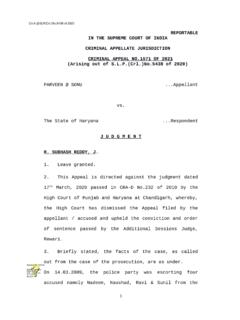
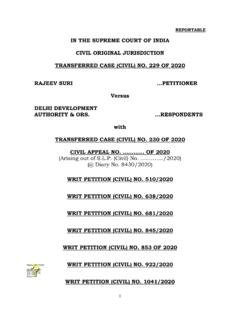
![[DEFAULT / OTHER MATTERS] [SERVICE/COMPLIANCE] …](/cache/preview/4/8/a/c/d/7/0/e/thumb-48acd70e206083f8f3d37421a64ec859.jpg)

